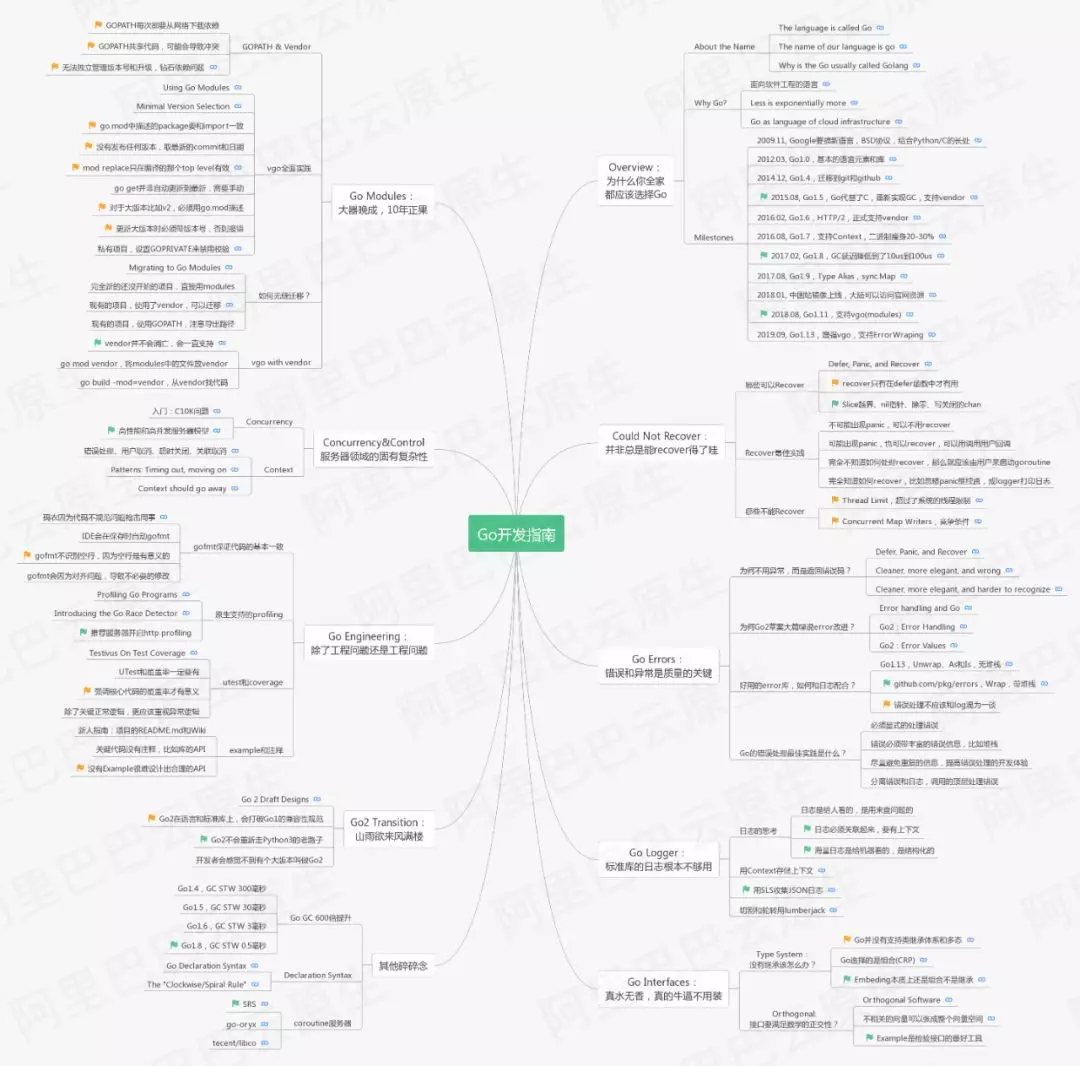Go 开发关键技术指南
Go 开发指南

点击 查看原文 可查看清晰知识大图!
Interfaces
Go 在类型和接口上的思考是:
- Go 类型系统并不是一般意义的 OO,并不支持虚函数;
- Go 的接口是隐含实现,更灵活,更便于适配和替换;
- Go 支持的是组合、小接口、组合+小接口;
- 接口设计应该考虑正交性,组合更利于正交性。
Type System
Go 的类型系统是比较容易和 C++/Java 混淆的,特别是习惯于类体系和虚函数的思路后,很容易想在 Go 走这个路子,可惜是走不通的。而 interface 因为太过于简单,而且和 C++/Java 中的概念差异不是特别明显,所以本章节专门分析 Go 的类型系统。
先看一个典型的问题 Is it possible to call overridden method from parent struct in golang? 代码如下所示:
package main
import (
"fmt"
)
type A struct {
}
func (a *A) Foo() {
fmt.Println("A.Foo()")
}
func (a *A) Bar() {
a.Foo()
}
type B struct {
A
}
func (b *B) Foo() {
fmt.Println("B.Foo()")
}
func main() {
b := B{A: A{}}
b.Bar()
}
本质上它是一个模板方法模式 (TemplateMethodPattern),A 的 Bar 调用了虚函数 Foo,期待子类重写虚函数 Foo,这是典型的 C++/Java 解决问题的思路。
我们借用模板方法模式 (TemplateMethodPattern) 中的例子,考虑实现一个跨平台编译器,提供给用户使用的函数是 crossCompile,而这个函数调用了两个模板方法 collectSource 和 compileToTarget:
public abstract class CrossCompiler {
public final void crossCompile() {
collectSource();
compileToTarget();
}
//Template methods
protected abstract void collectSource();
protected abstract void compileToTarget();
}
C 版,不用 OOAD 思维参考 C: CrossCompiler use StateMachine,代码如下所示:
// g++ compiler.cpp -o compiler && ./compiler
#include <stdio.h>
void beforeCompile() {
printf("Before compile\n");
}
void afterCompile() {
printf("After compile\n");
}
void collectSource(bool isIPhone) {
if (isIPhone) {
printf("IPhone: Collect source\n");
} else {
printf("Android: Collect source\n");
}
}
void compileToTarget(bool isIPhone) {
if (isIPhone) {
printf("IPhone: Compile to target\n");
} else {
printf("Android: Compile to target\n");
}
}
void IDEBuild(bool isIPhone) {
beforeCompile();
collectSource(isIPhone);
compileToTarget(isIPhone);
afterCompile();
}
int main(int argc, char** argv) {
IDEBuild(true);
//IDEBuild(false);
return 0;
}
C 版本使用 OOAD 思维,可以参考 C: CrossCompiler,代码如下所示:
// g++ compiler.cpp -o compiler && ./compiler
#include <stdio.h>
class CrossCompiler {
public:
void crossCompile() {
beforeCompile();
collectSource();
compileToTarget();
afterCompile();
}
private:
void beforeCompile() {
printf("Before compile\n");
}
void afterCompile() {
printf("After compile\n");
}
// Template methods.
public:
virtual void collectSource() = 0;
virtual void compileToTarget() = 0;
};
class IPhoneCompiler : public CrossCompiler {
public:
void collectSource() {
printf("IPhone: Collect source\n");
}
void compileToTarget() {
printf("IPhone: Compile to target\n");
}
};
class AndroidCompiler : public CrossCompiler {
public:
void collectSource() {
printf("Android: Collect source\n");
}
void compileToTarget() {
printf("Android: Compile to target\n");
}
};
void IDEBuild(CrossCompiler* compiler) {
compiler->crossCompile();
}
int main(int argc, char** argv) {
IDEBuild(new IPhoneCompiler());
//IDEBuild(new AndroidCompiler());
return 0;
}
我们可以针对不同的平台实现这个编译器,比如 Android 和 iPhone:
public class IPhoneCompiler extends CrossCompiler {
protected void collectSource() {
//anything specific to this class
}
protected void compileToTarget() {
//iphone specific compilation
}
}
public class AndroidCompiler extends CrossCompiler {
protected void collectSource() {
//anything specific to this class
}
protected void compileToTarget() {
//android specific compilation
}
}
在 C++/Java 中能够完美的工作,但是在 Go 中,使用结构体嵌套只能这么实现,让 IPhoneCompiler 和 AndroidCompiler 内嵌 CrossCompiler,参考 Go: TemplateMethod,代码如下所示:
package main
import (
"fmt"
)
type CrossCompiler struct {
}
func (v CrossCompiler) crossCompile() {
v.collectSource()
v.compileToTarget()
}
func (v CrossCompiler) collectSource() {
fmt.Println("CrossCompiler.collectSource")
}
func (v CrossCompiler) compileToTarget() {
fmt.Println("CrossCompiler.compileToTarget")
}
type IPhoneCompiler struct {
CrossCompiler
}
func (v IPhoneCompiler) collectSource() {
fmt.Println("IPhoneCompiler.collectSource")
}
func (v IPhoneCompiler) compileToTarget() {
fmt.Println("IPhoneCompiler.compileToTarget")
}
type AndroidCompiler struct {
CrossCompiler
}
func (v AndroidCompiler) collectSource() {
fmt.Println("AndroidCompiler.collectSource")
}
func (v AndroidCompiler) compileToTarget() {
fmt.Println("AndroidCompiler.compileToTarget")
}
func main() {
iPhone := IPhoneCompiler{}
iPhone.crossCompile()
}
执行结果却让人手足无措:
# Expect IPhoneCompiler.collectSource IPhoneCompiler.compileToTarget # Output CrossCompiler.collectSource CrossCompiler.compileToTarget



 浙公网安备 33010602011771号
浙公网安备 33010602011771号